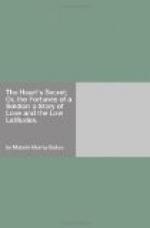“Your majesty, I have, never seen him,” answered the count, “but I’m told he’s a grim old war-horse, covered with scars gained in your majesty’s service.”
“Just as I had thought he must be,” continued the queen, “but some one intimated to us yesterday that he was young, quite young, and of noble family, Count Basterio.”
“He has displayed too much knowledge of warfare to be very young, your majesty,” said the count, “and has performed prodigies during this revolt, with only a handful of men.”
“That is partly what has so much interested me. I sent to the war office yesterday to know about him, and it was only recorded that he had been sent from Cuba. None of the heads of the department remembered to have seen him at all.”
“I saw by the Gazette that he would return to Madrid with his regiment to-day,” said the count, “when, if your majesty desires it, I will seek out this Colonel Bezan, and bring him to you.”
“Do so; for we would know all our subjects who are gallant and deserving, and I am sure this officer must be both, from what I have already been able to learn.”
“Your wish shall be obeyed, your majesty,” said the obsequious courtier, bowing low, and turning to a lady of the court, hard by, began to chat about how this old “son of a gun,” this specimen of the battle-field would be astonished at the presence of his queen.
“He’s all covered with scars, you say?” asked one of the ladies.
“Ay, senorita, from his forehead to his very feet,” was the reply.
“It will be immensely curious to see him; but he must look terrifically.”
“That’s true,” added the count; “he’s grizzly and rough, but very honest.”
“Can’t you have him muzzled,” suggested a gay little senorita, smiling.
“Never fear for his teeth, I wear a rapier,” added the count, pompously.
“But seriously, where’s he from?”
“Of some good family in the middle province, I understand.”
“O, he’s a gentleman, then, and not a professional cut-throat?” asked another.
“I believe so,” said the courtier.
“That’s some consolation,” was the rejoinder to the count’s reply.
While the merits of Lorenzo Bezan were thus being discussed, he was marching his regiment towards the capital, after a year’s campaign of hard fighting; and the Gazette was right in its announcement, for he entered the capital on the evening designated, and occupied the regularly assigned barracks for his men.
CHAPTER XII.
The queen and the soldier.
It was a noble and brilliant presence into which Lorenzo Bezan was summoned on the day following his arrival from the seat of war. Dons and senoras of proud titles and rich estates, the high officials of the court, the prime ministers the maids of honor, the gayly dressed pages and men-at-arms, all combined to render the scene one of most striking effect.




